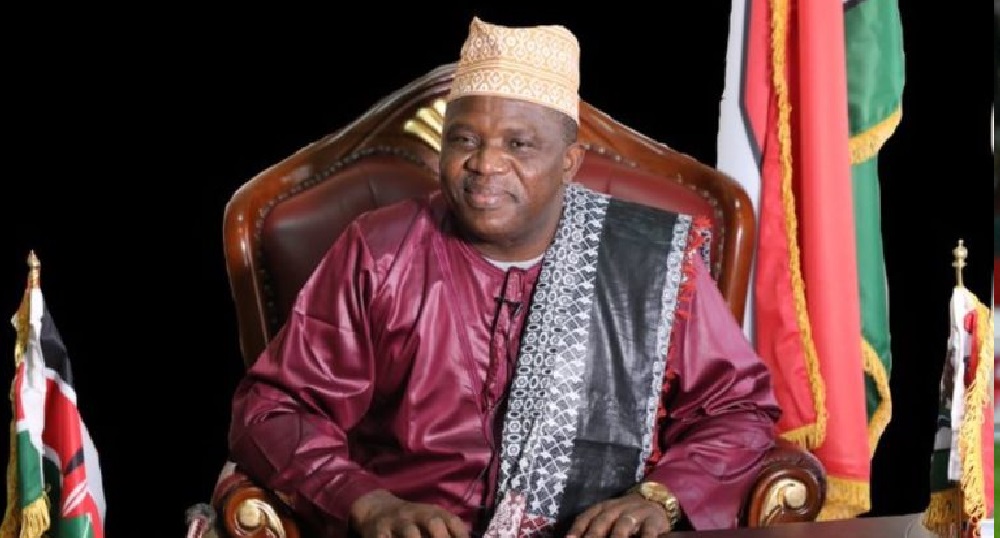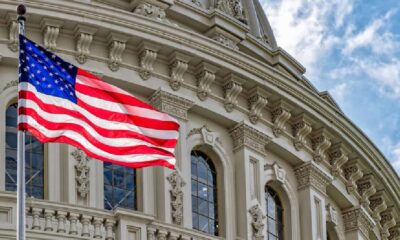Foreign
Kenyan Governor Detained Over Violent Clan Disputes

A regional governor in Kenya has been taken into custody due to his involvement in clan violence in the Tana River County, where multiple fatalities have occurred.
Dhadho Godhana, along with a local legislator, were arrested separately for failing to comply with summonses regarding the clashes, as stated by the police on Saturday. The accused individuals have not publicly addressed the allegations.
The clashes in southeast Kenya have resulted in the deaths of at least 14 people, leading the authorities to declare two areas in the county as hazardous and insecure for the next 30 days.
According to an official notice from the Interior Ministry, security measures have been intensified in these areas, and residents are prohibited from carrying weapons.
DCI chief Mohamed Amin confirmed that Godhana presented himself at the Directorate of Criminal Investigations (DCI) headquarters in Nairobi on Saturday morning and is being interrogated about the clashes.
Five politicians from Tana River County have been summoned to appear before the National Cohesion and Integration Commission (NCIC) on Monday for questioning regarding allegations of instigating conflict between two communities.
Tana River has previously experienced ethnic clashes over disputes about grazing rights, resulting in numerous fatalities.
Foreign
Ukraine Accuses Russia Of Launching 2800 Aerial Bombs, Over 1400 Drones In 14 Days

Ukrainian President, Volodymyr Zelensky, has accused Russia of ongoing hostilities, stating that since the beginning of April, Russia has launched nearly 2,800 aerial bombs, over 1,400 Shahed drones, and approximately 60 missiles at Ukraine.
Zelensky’s statement, released on Monday, reads, “Currently, 38 people are receiving treatment inmedical facilities in Sumy following yesterday’s Russian ballistic strike — among them, 9 children. Eleven people, including 3 children, are in critical condition.”
“Every effort is being made to provide them with maximum assistance. Yesterday’s strike alone claimed 34 lives and left 119 people injured. Tragically, 2 children were killed, and another 15 were wounded.”
“Another 7 people were injured overnight in Odesa during a ‘Shahed’ drone attack. Last night, the Russians also struck Slovyansk, Uman, Kharkiv, Beryslav, and other cities and villages.”
“All the damaged sites are civilian: apartment buildings, stores, a car service station.”
“I thank all the services and everyone involved in rescuing people and defending lives. Russian terror continues every day and night. Since the beginning of April alone, the Russian army has used nearly 2800 aerial bombs, over 1400 attack drones — most of them ‘Shaheds’ — and nearly 60 missiles of various types, including ballistic ones.”
“Only real pressure on Russia can stop this. Tangible sanctions are needed against the sectors that finance Russia’s killing machine. The one who brought the war must be stopped and held accountable for what they have done; that is only fair,” Zelensky said.
In an earlier statement yesterday, Zelensky urged the world not to remain silent in the face of Russia’s continued aggression against Ukraine: “As of now, 31 people are known to have been killed in Sumy by the Russian ballistic missile strike. Among those killed were two children. My condolences to the families and loved ones… More than 84 people have been wounded, including 10 children. All of them are receiving the necessary assistance.”
“It is crucial that the world does not stay silent or indifferent. Russian strikes deserve nothing but condemnation. There must be pressure on Russia to end the war and guarantee security for people. Without truly strong pressure, without sufficient support for Ukraine, Russia will continue dragging this war out.”
Zelensky also accused Russia of rejecting a potential peace opportunity involving U.S. President Donald Trump.
“It’s now the second month that Putin has been ignoring the U.S. proposal for a full and unconditional ceasefire. Unfortunately, there in Moscow they are convinced they can keep killing with impunity. Action is needed to change this situation.”
World leaders have condemned the latest wave of Russian attacks and pledged solidarity with Ukraine.
On Saturday, top diplomats from Russia and Ukraine traded accusations over breaches of a tentative ceasefire agreement brokered by the United States. The deal aimed to halt attacks on critical energy infrastructure, signaling an attempt to ease tensions in the third year of the war.
However, Sunday’s strike underscored the fragility of such negotiations and the continued toll on Ukrainian civilians.
The war, which began with Russia’s full-scale invasion in February 2022, has resulted in tens of thousands of deaths and millions displaced, with no comprehensive peace agreement in sight.
International observers have raised concerns that the missile strike may constitute a violation of international humanitarian law.
Sumy, located near Ukraine’s northeastern border with Russia, has faced repeated assaults since the war began but had seen a relative lull in recent months. Sunday’s bombing marks one of the deadliest strikes in the region in over a year.
Ukrainian officials have called on allies to increase military aid and intensify sanctions on Russia, warning that continued attacks on civilian areas threaten any hope for a negotiated resolution to the war.
Foreign
US orders 30-day registration for all foreign nationals or face jail, deportation

By Francesca Hangeior
The United States Department of Homeland Security (DHS) has announced a new rule requiring all foreign nationals who stay in the country for more than 30 days to register with the federal government.
The directive, introduced this week, is one of the strictest immigration measures in recent years.
In a post titled “Message to Illegal Aliens” and tagged to President Donald Trump and Homeland Security Secretary Kristi Noem, the agency stated,
“Foreign nationals present in the U.S. longer than 30 days must register with the federal government. Failure to comply is a crime punishable by fines and imprisonment. @POTUS Trump and @Sec_Noem have a clear message to Illegal aliens: LEAVE NOW and self-deport.”
Foreign nationals present in the U.S. longer than 30 days must register with the federal government. Failure to comply is a crime punishable by fines and imprisonment. @POTUS Trump and @Sec_Noem have a clear message to Illegal aliens: LEAVE NOW and self-deport. pic.twitter.com/FrsAQtUA7H
Non-compliance could lead to daily fines of $998, heavier penalties for those who promise to leave but don’t, imprisonment, and permanent bans from re-entry.
DHS warned that delaying registration will increase penalties and reduce the chances of returning legally.
“The longer you wait, the higher the penalty, and the slimmer your chances of returning,” the department said.
The agency also introduced a “safe exit” provision for undocumented individuals who choose to leave voluntarily.
Those who self-deport may be allowed to select their departure flight, keep their earnings if they haven’t committed any crimes, apply for subsidized travel if they can’t afford it, and stay eligible for future immigration pathways.
While the rule doesn’t currently apply to individuals on valid visas like H-1B or F-1, DHS emphasized that once a visa becomes invalid—due to expiration, job loss, or program termination—the individual is considered “unlawfully present” and subject to the same penalties.
Maintaining legal status, the agency noted, is more critical than ever.
Foreign
Swiss woman abducted in Niger Republic

By Francesca Hangeior
A Swiss citizen has been kidnapped in Niger, Switzerland’s foreign ministry told AFP, confirming information published by a Nigerien media outlet.
The foreign ministry said it had been “informed of the kidnapping of a Swiss citizen in Niger.
“The Swiss diplomatic mission in Niamey is in contact with the local authorities. Clarifications are under way.”
The governor of the Nigerien state of Agadez, General Ibra Boulama Issa, said the abduction happened in Agadez city, where an Austrian woman was kidnapped three months ago.
The general said “a foreign woman… of Swiss nationality” had been taken from her home there late Sunday.
In a statement, he also referenced the January 11 kidnapping of the Austrian.
-

 News21 hours ago
News21 hours agoJust in: Namibia Moves to Deport Over 500 Americans in Bold Visa Policy Shift
-

 News21 hours ago
News21 hours agoRivers women rally in support of state of emergency
-

 News16 hours ago
News16 hours agoYou must refund N300m, Rivers State tells NBA
-

 Politics19 hours ago
Politics19 hours agoBwala accuses Senator Ndume of plans to defect from APC
-

 Foreign17 hours ago
Foreign17 hours agoUS orders 30-day registration for all foreign nationals or face jail, deportation
-

 News4 hours ago
News4 hours agoPeter Obi speaks as Benue govt. blocks humanitarian visit
-

 News21 hours ago
News21 hours agoSoldiers rescue 16 kidnapped passengers in Plateau
-

 News19 hours ago
News19 hours agoPolice sack officer who killed one, injured two in Calabar





